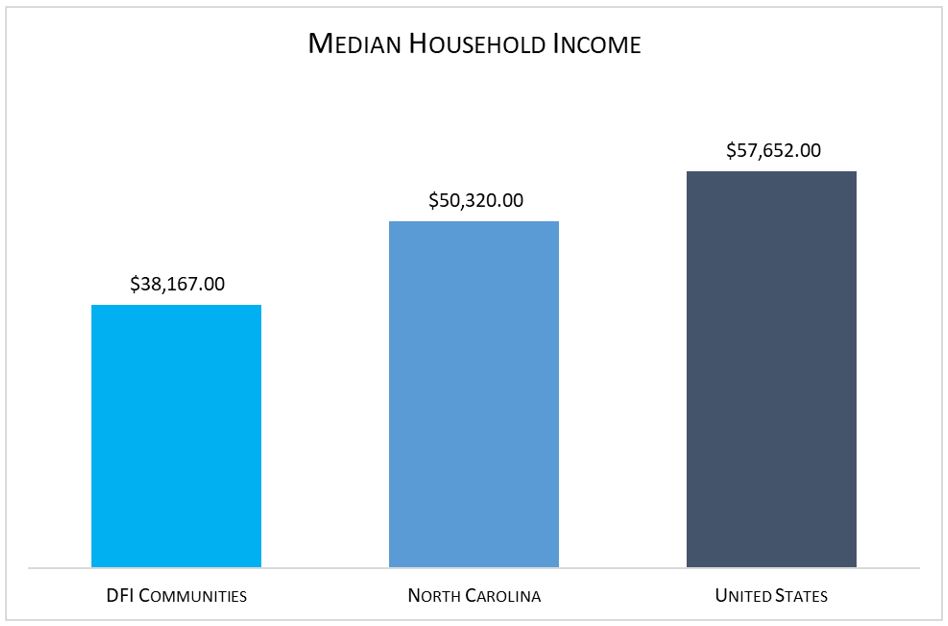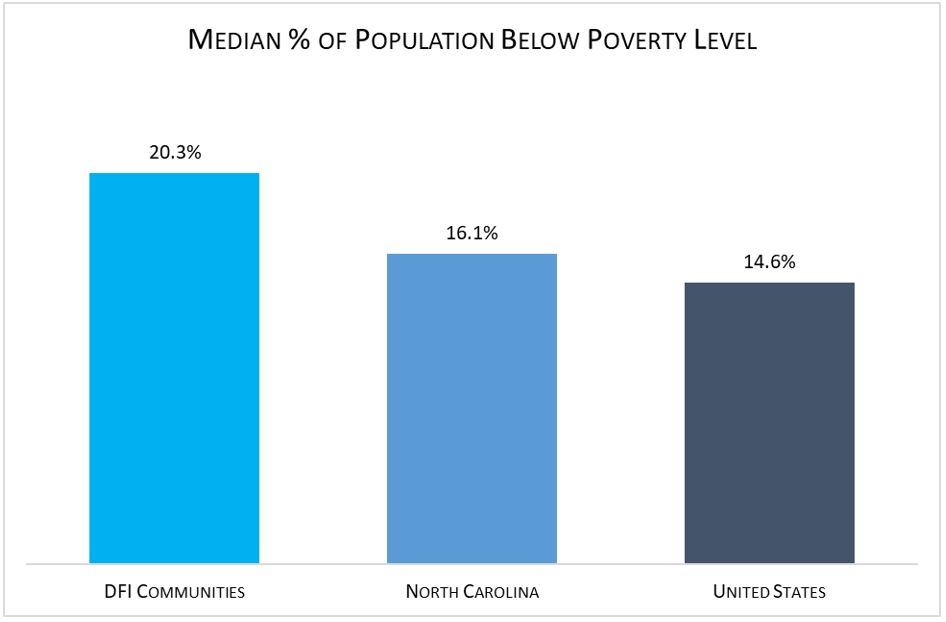|
|
UNC DFI: Of the Public, For the PublicBy CED Guest AuthorPublished July 26, 2019The mission of the School of Government is to improve the lives of North Carolinians through training, advising, and scholarship for public officials. However, when it became clear that a phone call or email exchange would not be adequate help for a local government trying to navigate the complex world of private development, faculty member Tyler Mulligan created the Development Finance Initiative (DFI). A common criticism of academic institutions is that the knowledge produced rarely yields real-world impact for the surrounding communities, but the 134 projects UNC DFI has worked on over the last eight years tell a different story. DFI’s service to the state is a story of hope for North Carolina’s future. Housed at UNC, DFI has partnered with geographically and economically diverse communities, from urban metropolitans to rural towns, and spanning 38 Senate (76%) and 66 House districts (55%) in North Carolina. DFI is investing time and expertise in the areas of North Carolina that need it most – those with limited resources. Since 2011, UNC DFI has collaborated with local governments across the state, whose collective populations total approximately 3.1 million North Carolinians. DFI partner communities have populations ranging in size from 110 in Seven Springs to 900,993 in Wake County, and median incomes ranging from $17,424 in Boone to $120,658 in Davidson. Of all communities served by DFI, the median population size is 8,461, the median income is $38,167, and the median percentage of residents living below the poverty level is 20.3%. Based on 2010 Census determinations, 49% of all DFI projects have taken place rural communities, and 76% of DFI projects take place in communities with more than 15% of residents living below the poverty level. The median community served by UNC DFI has a population under 9,000, a median household income well-below the national median (Figure 1), and a greater proportion of the population living below the poverty-line (Figure 2). The investments DFI helps these communities to attract offers a chance to change these statistics and an opportunity to revitalize their futures. UNC DFI is not an academic institution generating knowledge in isolation; DFI is a community-focused organization tangibly addressing the needs of local governments across the state. Some of North Carolina’s most distressed communities have turned to DFI for support. Following UNC’s pillar “of the public, for the public,” DFI has invested thousands of person-hours to foster real change to the economic and physical landscapes of underserved communities across North Carolina.
Figure 1. Median household income based on data from the 2013-2017 American Community Survey
Figure 2. Median population below the poverty level based on data from the 2013-2017 American Community Survey Our methodology All UNC DFI project locations were matched to publicly available data from the 2010 U.S. Census, the 2013-2017 American Community Survey (ACS), and the North Carolina Find My Legislator website. A few things to note:
Sarah Mye is the School of Government’s Leadership Team Project Manager. Her work focuses on impact measurement. She holds an MPH in health behavior from UNC-Chapel Hill and a BA in psychology and political science from the State University of New York at Buffalo. |
Published July 26, 2019 By CED Guest Author
The mission of the School of Government is to improve the lives of North Carolinians through training, advising, and scholarship for public officials. However, when it became clear that a phone call or email exchange would not be adequate help for a local government trying to navigate the complex world of private development, faculty member Tyler Mulligan created the Development Finance Initiative (DFI). A common criticism of academic institutions is that the knowledge produced rarely yields real-world impact for the surrounding communities, but the 134 projects UNC DFI has worked on over the last eight years tell a different story.
DFI’s service to the state is a story of hope for North Carolina’s future. Housed at UNC, DFI has partnered with geographically and economically diverse communities, from urban metropolitans to rural towns, and spanning 38 Senate (76%) and 66 House districts (55%) in North Carolina. DFI is investing time and expertise in the areas of North Carolina that need it most – those with limited resources.
Since 2011, UNC DFI has collaborated with local governments across the state, whose collective populations total approximately 3.1 million North Carolinians. DFI partner communities have populations ranging in size from 110 in Seven Springs to 900,993 in Wake County, and median incomes ranging from $17,424 in Boone to $120,658 in Davidson. Of all communities served by DFI, the median population size is 8,461, the median income is $38,167, and the median percentage of residents living below the poverty level is 20.3%. Based on 2010 Census determinations, 49% of all DFI projects have taken place rural communities, and 76% of DFI projects take place in communities with more than 15% of residents living below the poverty level.
The median community served by UNC DFI has a population under 9,000, a median household income well-below the national median (Figure 1), and a greater proportion of the population living below the poverty-line (Figure 2). The investments DFI helps these communities to attract offers a chance to change these statistics and an opportunity to revitalize their futures.
UNC DFI is not an academic institution generating knowledge in isolation; DFI is a community-focused organization tangibly addressing the needs of local governments across the state. Some of North Carolina’s most distressed communities have turned to DFI for support. Following UNC’s pillar “of the public, for the public,” DFI has invested thousands of person-hours to foster real change to the economic and physical landscapes of underserved communities across North Carolina.
Figure 1. Median household income based on data from the 2013-2017 American Community Survey
Figure 2. Median population below the poverty level based on data from the 2013-2017 American Community Survey
Our methodology
All UNC DFI project locations were matched to publicly available data from the 2010 U.S. Census, the 2013-2017 American Community Survey (ACS), and the North Carolina Find My Legislator website.
A few things to note:
- In total DFI has produced 134 projects across North Carolina to date; however not all 134 were included in the analyses.
- Two were excluded from the legislative district analysis as they did not include the location information needed to determine the legislative district. This brought the total included in the legislative analyses to 132.
- One was excluded from the demographic analysis as it took place in a community whose demographics were not included on the US Census Bureau website. This brought the total included in the demographic analyses to 133.
- Legislators included in this analysis are those currently in office. Some DFI projects occurred during previous legislative sessions with different elected officials.
- Classifications of DFI projects as Urbanized Area, Urban Cluster, or Rural were based off the list provided on the US Census Bureau website from the 2010 Census.
Sarah Mye is the School of Government’s Leadership Team Project Manager. Her work focuses on impact measurement. She holds an MPH in health behavior from UNC-Chapel Hill and a BA in psychology and political science from the State University of New York at Buffalo.
Author(s)
Tagged Under
This blog post is published and posted online by the School of Government to address issues of interest to government officials. This blog post is for educational and informational Copyright ©️ 2009 to present School of Government at the University of North Carolina. All rights reserved. use and may be used for those purposes without permission by providing acknowledgment of its source. Use of this blog post for commercial purposes is prohibited. To browse a complete catalog of School of Government publications, please visit the School’s website at www.sog.unc.edu or contact the Bookstore, School of Government, CB# 3330 Knapp-Sanders Building, UNC Chapel Hill, Chapel Hill, NC 27599-3330; e-mail sales@sog.unc.edu; telephone 919.966.4119; or fax 919.962.2707.




6 Responses to “UNC DFI: Of the Public, For the Public”
Dr. Patricia Mitchell
Thank you for this data…I’ve worked with DFI when at the Department of Commerce in the Rural Development Division and they were contracted to do the visioning/planning for the Old Broughton area in Burke County. DFI is an important resource for the State of NC and its communities. Great work by knowledgeable individuals.
Tony Marshall
DFI appears to be the perfect application of our educational institutions knowledge applied to the problems of our most vulnerable citizens. Who could ask for a better application of expertise.
Rodger Lentz
DFI has truly benefitted Wilson, NC. From assistance in analyzing where we were in regards to distressed properties to developing implementable strategies, DFI has helped us move the needle on downtown revitalization. Most of all, DFI helped us understand the private side of development so we were better prepared when negotiating real world deals.
Jay Gibson, P.E.
DFI has, and continues, to provide a significant base of expertise to fill a void at a critical time in the history of our State, Counties, and communities. As resources become more scarce, stretched by the demand for an ever-growing array of services, it is critical for leaders to analyze and maximize the return on each and every public dollar. This is especially true for public funds contemplated for investment in P3’s or other endeavors formerly outside the scope of local government activities. Kudos to DFI – and the School of Government – for bringing together the expertise and resources to appropriately counsel and guide local governments from concept to completion in these activities.
Stephanie Watkins-Cruz
DFI’s impact is unsurprisingly vast. As a fellow, DFI taught me to understand how to understand aspects of real estate development that I frequently use today in my professional role as a Policy Analyst for Chatham County. By understanding ways in which private investment can be leveraged to see public goals come to fruition, I’m able to communicate not only to our leadership team, but also to our board, exactly how we are able to collaborate with the private sector, and why it is important that we do so. Before my time at UNC, a DFI class did a project on the Henry Siler School in Siler City. One of the proposed uses of that project was affordable housing. Fast forward a handful of years, leadership in the County made intentional decisions- the contribution of land, a low-interest loan- to support the Henry Siler School’s transformation into 44 affordable housing units. Those 44 units will come online late 2020. Thanks to that analysis, the path to accomplishing something of great public value was identified, and will be accomplished. I plan to continue using the invaluable lessons I learned from DFI to bring more affordable housing to Chatham County through intentional public-private partnerships. I’m incredibly glad they exist and are continuing to help communities like mine and all over North Carolina in more ways than one.
John Connet
The City of Hendersonville has worked with DFI on multiple projects over the past six years. In the early years, DFI assisted our City Council and staff with understanding the private developers perspective and what questions to ask when negotiating a public- private partnership. DFI was a critical member of the team that negotiated the partnership that resulted in the redevelopment of the Grey Hosiery Mill. The mission of the UNC School of Government has always been to train local government officials. DFI is an extension of this mission and I can attest that their work has increased the organizational capacity of the Hendersonville staff to negotiate public-private partnerships. This capacity will be critical for the future success of our community.